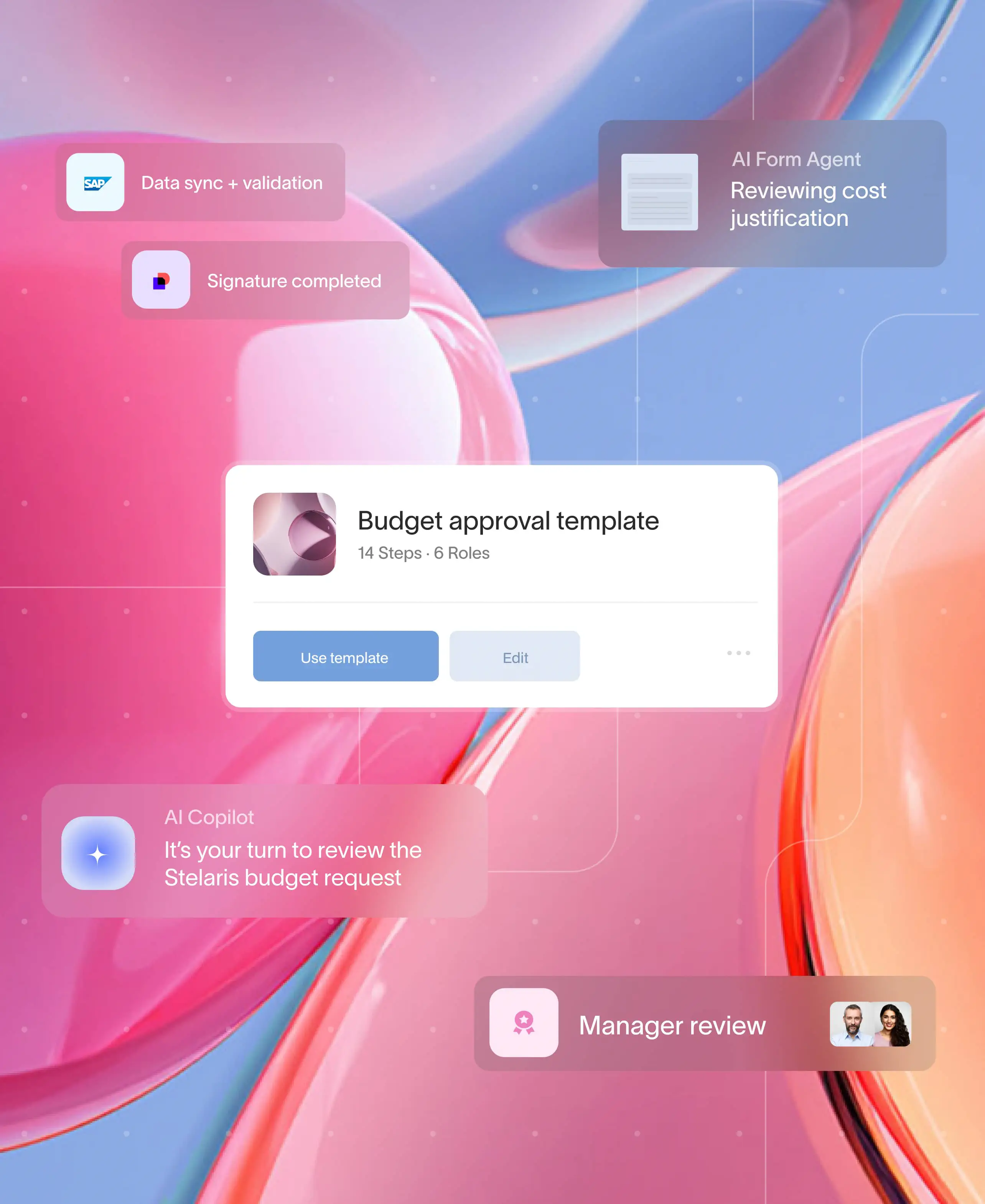.png)
At a glance
Manual HIPAA compliance management increases the risk of errors, delays, and PHI exposure.
Automation secures evidence flows, centralizes approvals, and maintains tamper-proof audit trails that meet HIPAA Security Rule standards.
Moxo streamlines document collection, PHI sharing approvals, vendor attestations, and training acknowledgments through automated workflows.
With role-based access controls, audit logs, and secure reporting, Moxo helps healthcare organizations maintain compliance and protect patient data.
HIPAA tasks you can streamline
The risks of manual PHI workflows
HIPAA compliance often fails not because of intent but because of fragmented, manual processes. PHI is emailed between departments, approvals happen informally, and audit trails are incomplete. Each gap creates audit risk and undermines trust.
A mid-sized outpatient clinic relied on email chains for PHI access requests. When auditors demanded proof of authorization, the compliance team had to dig through inboxes and spreadsheets. Weeks of work were required to reconstruct the approvals that should have been available instantly.
Automating evidence and approvals
Automation eliminates ambiguity and standardizes how tasks are completed. With Moxo workflows, organizations can:
PHI evidence collection
Patients and staff upload PHI through encrypted file requests instead of insecure email. Submissions are logged, version-controlled, and tied to specific workflows for audit defense.
Approvals for PHI use or sharing
HIPAA requires sign-off before PHI is accessed or disclosed. Moxo provides multi-step approvals where compliance officers, managers, or legal teams must review requests before access is granted.
Vendor attestations
Business associates must confirm compliance obligations. Moxo automates this through structured workflows with digital signatures and secure storage.
Policy acknowledgments and training
HIPAA training acknowledgments are distributed automatically, and each staff acknowledgment is timestamped and recorded for proof during audits.
Organizations that automate these tasks cut compliance gaps, reduce wasted staff time, and strengthen their audit readiness.
Secure evidence and approvals in Moxo
Managing PHI safely
Evidence collection is a critical compliance challenge. Moxo’s document collection solution enables secure, centralized file requests. PHI is encrypted in transit and at rest, while version control ensures accuracy.
A compliance officer from a healthcare network wrote in a G2 review: “Moxo made PHI collection structured and secure. Each file request was logged, encrypted, and linked to the right workflow. Our compliance cycle became more efficient.”
Structured approvals
Approvals for PHI access are logged at every step in Moxo. Workflows can require multiple sign-offs and track milestones automatically. For instance, a request to view billing data could route to a manager and then a compliance officer before being approved.
Reducing delays while maintaining oversight
Automation eliminates bottlenecks without bypassing oversight. An anonymized case study from a health IT vendor showed PHI approval delays were reduced by 60 percent and audit prep time was cut in half using Moxo’s structured workflows.
Role-based access and audit trails
Why access control is critical
HIPAA’s Security Rule requires PHI access to be restricted to the “minimum necessary.” Many organizations fail here because shared accounts and unmanaged permissions create blind spots.
How Moxo enforces transparency
Moxo security features provide role-based access control (RBAC), limiting PHI visibility to authorized roles. For example, a billing clerk can view insurance forms but not clinical records.
Moxo also maintains immutable audit logs of all PHI interactions: who accessed files, when, and what actions were taken. Logs are timestamped, tamper-proof, and retained according to HIPAA requirements.
Real-world case: audit log defense
A healthcare research provider used Moxo to export PHI access logs during a compliance review. Instead of reconciling multiple systems, they produced a single export showing authorized access for the clinical study.
Kiteworks highlights that HIPAA audit logs must capture all access events, remain tamper-proof, and be retained for six years. Moxo aligns with these requirements by embedding audit trails into every workflow.
Reporting and exports
The burden of audit readiness
Preparing for HIPAA audits is resource-intensive when evidence is scattered across tools and email. Compliance officers often spend weeks compiling incomplete data.
Real-time dashboards
Moxo provides dashboards that display compliance workflow status, task completion, and pending approvals. Risks are visible in real time so teams can intervene before audits.
Secure audit exports
For audits, Moxo generates tamper-proof exports of PHI workflows, approvals, and logs. Reports can be shared securely with auditors via controlled, time-bound links.
An anonymized business associate reported reducing audit preparation time from three weeks to three days after adopting Moxo’s reporting and export features.
Templates to copy
PHI upload and approval workflow
Staff upload a patient file, which routes to a manager for review, then to compliance for final approval before secure archiving.
Vendor PHI sharing workflow
Vendors request PHI access through secure forms. Legal and compliance approve, and access is provisioned with expiration rules.
Incident response workflow
When a PHI incident occurs, the workflow records the event, assigns responsibilities, tracks remediation, and notifies leadership. Each step is timestamped for accountability.
Moxo workflow templates accelerate HIPAA adoption while allowing customization to match internal policies and security models.
The future of HIPAA compliance automation
Manual HIPAA compliance can’t keep pace with stricter audits, rising patient expectations, and the high cost of breaches. Moxo embeds compliance into daily workflows with evidence collection, structured approvals, role-based access, audit logs, and templates—transforming compliance from a last-minute scramble into a managed process. Healthcare organizations that automate save staff hours, cut audit prep cycles, reduce exceptions, and strengthen patient trust.
The path forward is clear: providers, payers, and business associates who move beyond manual methods gain measurable efficiency, security, and trust. Book a demo to see how HIPAA-safe workflows can streamline compliance and deliver ROI.
FAQs
How does Moxo support HIPAA compliance automation?
Moxo assists organizations by securing PHI evidence flows, enabling structured approvals, enforcing role based access, and maintaining audit logs. These features align with HIPAA compliance expectations and improve operational efficiency.
How long does it take to implement HIPAA workflows in Moxo?
Organizations typically launch a pilot workflow in weeks using Moxo templates, then expand adoption across more PHI workflows.
What integrations does Moxo support for HIPAA workflows?
Moxo integrates with identity providers (SSO, MFA), secure document management systems, and e signature tools to protect PHI across connected systems.
How does Moxo ensure audit log integrity?
All actions in Moxo are timestamped, immutable, and exportable in tamper-proof formats. Audit logs comply with HIPAA retention and integrity requirements.
What ROI can organizations expect from HIPAA compliance automation with Moxo?
Moxo customers report reduced audit prep time, fewer compliance exceptions, and significant time savings in PHI approvals and evidence collection. These results translate into lower costs and stronger patient trust.






